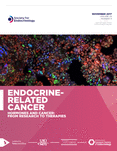Developing treatment for adrenocortical carcinoma
- 1Department of Internal Medicine, Maxima Medical Center, Ds. Th. Fliednerstraat 1, 5631 BM Eindhoven/Veldhoven, The Netherlands
2Division of General Internal Medicine, Department of Internal Medicine, Maastricht University Medical Centre+, Maastricht, The Netherlands
3Department of Health Services Research and CAPHRI School for Public Health and Primary Care, Maastricht University Medical Center, The Netherlands
- Correspondence should be addressed to T M A Kerkhofs; Email: t.kerkhofs{at}mmc.nl
Abstract
Cancer of the adrenal cortex (ACC) is a rare endocrine malignancy with limited treatment options. Patients typically present with autonomous hormonal overproduction and/or a large abdominal mass. Hormonal assays and medical imaging can be diagnostic, but urinary steroid profiling might be a more sensitive technique to assess malignancy in adrenal tumours. The stage of the disease at diagnosis is the most important prognostic factor. The current staging system needs refinement, especially to separate aggressive from indolent disease in stage IV patients and to select patients who need adjuvant treatment after complete surgical resection. Regarding the latter, assessing the proliferation index Ki-67 seems the best tool currently available. Genomic profiling is expected to become of clinical relevance in the future. Medical therapy is centred on the adrenolytic drug mitotane, which carries considerable toxicity and is not easy to manage. Its tolerability and long plasma level build-up phase may be improved by therapeutic drug monitoring based on pharmacokinetic modelling and intensive counselling of patients. Current chemotherapy regimens can offer disease stabilization in about 50% of patients, but an objective response should be expected in <25%. Research on targeted therapy and immunotherapy is difficult in this rare disease with often heavily pre-treated patients and has not yet been successful. Quality of care should be ensured by treating patients in centres with established experience in multidisciplinary oncologic care, who adhere to prevailing guidelines and state-of-the-art in diagnostic and treatment concepts. International collaboration in fundamental research and clinical trials is the key to further elucidate the pathogenesis and to improve patient care.
- Revision received 5 August 2015
- Accepted 10 August 2015
- Made available online as an Accepted Preprint 10 August 2015
- © 2015 Society for Endocrinology












